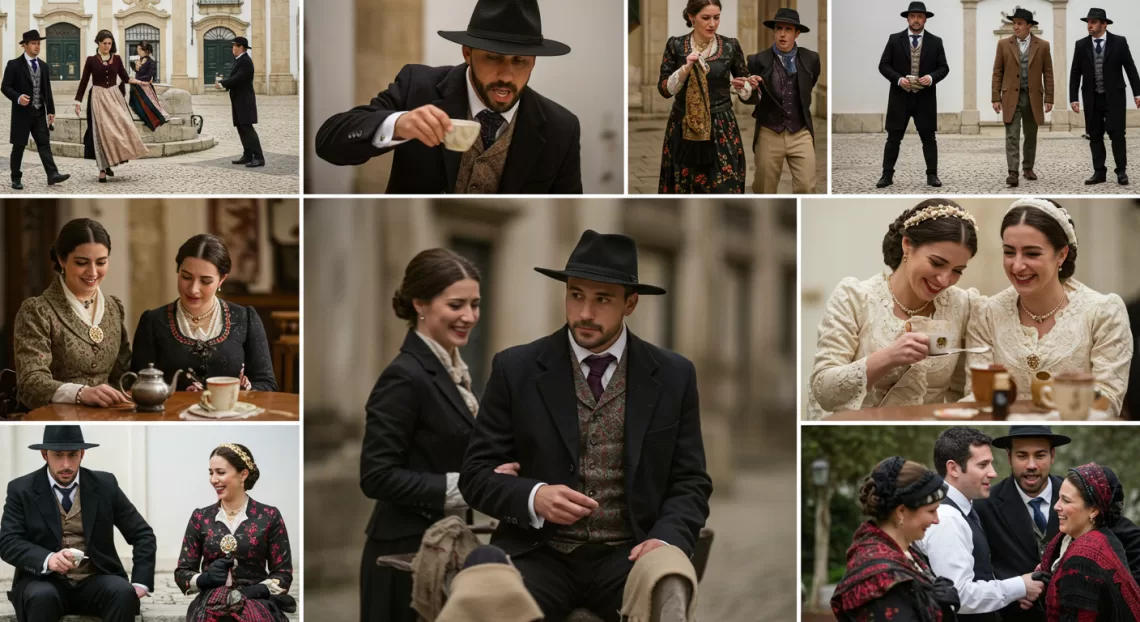
Understanding Portuguese Customs and Etiquette: A Guide for Expats and Travelers
Imagine arriving in Portugal, the land of sun-kissed beaches, soulful Fado music, and delectable pastéis de nata. You’re excited to immerse yourself in the culture, but a wave of uncertainty washes over you. Will you accidentally offend someone? Are you dressed appropriately? What’s the proper way to greet a local?
Fear not! This comprehensive guide is designed to help you navigate the nuances of Portuguese customs and etiquette, ensuring a smooth and respectful experience. Whether you’re planning a short vacation or considering a permanent move, understanding Portuguese customs and etiquette is key to creating positive interactions and truly connecting with the locals.
Key Takeaways:
- Greetings in Portugal are generally formal, especially in initial encounters. A handshake and a polite “Bom dia/Boa tarde/Boa noite” are usually appropriate.
- Punctuality is valued, but a slight delay is often tolerated.
- Dining is a social affair, and it’s customary to wait for everyone to be served before eating.
- Dress codes are generally smart casual, but dressing up for formal occasions is expected.
- Learning a few basic Portuguese phrases will go a long way in showing respect and facilitating communication.
Greetings and Introductions: The Art of Saying Hello
Initial Encounters: Formality First
When understanding Portuguese customs and etiquette, the first thing to grasp is the importance of formality, especially when meeting someone for the first time. A firm handshake is the standard greeting, accompanied by eye contact and a polite phrase.
- Bom dia: Good morning (used until lunchtime)
- Boa tarde: Good afternoon (used from lunchtime until sunset)
- Boa noite: Good evening/Good night (used from sunset onwards)
The use of titles is also common. Address people as Senhor (Mr.), Senhora (Mrs.), or Senhorita (Miss) followed by their last name, unless they specifically invite you to use their first name.
Moving to Familiarity: The Transition to First Names
As relationships develop, the formality may gradually decrease. However, it’s best to wait for the Portuguese person to initiate the transition to using first names. This shows respect for their culture and avoids any potential offense.
An anecdote: I once met a Portuguese businessman and addressed him as “Senhor Silva” for several weeks. One day, he smiled and said, “Please, call me João.” That simple gesture signaled a shift in our relationship, moving from a formal business acquaintance to a more friendly connection.
Physical Contact: The Beijinhos Exception
In some social contexts, especially among women or between a man and a woman who are friends or relatives, beijinhos (small kisses on both cheeks) are common. However, avoid initiating beijinhos unless you are certain it is appropriate. It’s generally best to observe and follow the lead of the Portuguese person.
Communication Styles: Directness and Nuance
Language: The Key to Connection
While many Portuguese people, especially in tourist areas, speak English, making an effort to learn a few basic Portuguese phrases is highly appreciated. It demonstrates respect for their culture and can significantly enhance your interactions.
Useful phrases include:
- Obrigado/Obrigada: Thank you (masculine/feminine)
- Por favor: Please
- Com licença: Excuse me
- De nada: You’re welcome
- Desculpe: Sorry
- Não falo português: I don’t speak Portuguese
Non-Verbal Communication: Deciphering the Signals
Body language plays a significant role in communication. Portuguese people tend to be expressive, using hand gestures and facial expressions to emphasize their points. Eye contact is important, as it conveys sincerity and attentiveness.
Directness vs. Indirectness: Finding the Balance
Portuguese communication style can be both direct and indirect. While they may be straightforward in expressing their opinions, they also value politeness and avoid confrontation. It’s important to be mindful of your tone and phrasing to avoid causing offense.
Punctuality: A Matter of Perspective
Is Portugal on Time?
Punctuality is generally valued in Portugal, but a slight delay is often tolerated. Arriving a few minutes late for a social gathering is not considered a major faux pas. However, for business meetings and formal events, it’s best to arrive on time.
The Hora Portuguesa (Portuguese Time)
There’s a saying in Portugal: Hora Portuguesa, which roughly translates to “Portuguese time.” It acknowledges the more relaxed attitude towards punctuality compared to some other cultures. While it’s not an excuse for excessive tardiness, it reflects a more flexible approach to time management.
Dining Etiquette: Sharing Food and Conversation
Mealtimes: A Social Affair
Dining in Portugal is more than just sustenance; it’s a social occasion to be enjoyed with friends and family. Mealtimes are often leisurely, with conversations flowing freely.
Table Manners: The Dos and Don’ts
- Wait for everyone to be served before starting to eat.
- Keep your hands above the table, but not your elbows on the table.
- Use utensils to eat, even for dishes like rice.
- It’s customary to offer to share your food with others.
- Don’t cut your salad with a knife; fold the leaves with your fork.
- If you are invited to someone’s home, it’s polite to bring a small gift, such as flowers or wine.
Tipping: Showing Appreciation
Tipping is not mandatory in Portugal, but it’s customary to leave a small tip (around 5-10%) for good service in restaurants, cafes, and taxis.
Dress Code: Smart Casual with a Touch of Elegance
Everyday Attire: Comfort and Style
The dress code in Portugal is generally smart casual. Jeans, t-shirts, and sneakers are acceptable for everyday wear, but it’s important to be well-groomed and presentable.
Formal Occasions: Dressing to Impress
For formal events, such as weddings, parties, or business meetings, dressing up is expected. Men typically wear suits or dress shirts and trousers, while women opt for dresses, skirts, or elegant pantsuits.
Beachwear: Knowing the Boundaries
While Portugal is known for its beautiful beaches, it’s important to be mindful of where beachwear is appropriate. Avoid wearing swimsuits or beach attire in shops, restaurants, or public transportation.
Gift-Giving: Gestures of Appreciation
Occasions for Gift-Giving
Gift-giving is common in Portugal for birthdays, Christmas, and other special occasions. When invited to someone’s home for dinner, it’s polite to bring a small gift, such as flowers, wine, or a box of chocolates.
Choosing the Right Gift
When selecting a gift, consider the recipient’s preferences and interests. A thoughtful and personalized gift is always appreciated. Avoid giving overly expensive gifts, as this can make the recipient feel uncomfortable.
Presenting the Gift
When presenting the gift, do so with a smile and a genuine expression of appreciation. It’s customary to unwrap the gift immediately in front of the giver.
Business Etiquette: Building Professional Relationships
First Impressions: Formal and Respectful
In business settings, it’s important to maintain a formal and respectful demeanor. Dress professionally and address people by their titles (Senhor, Senhora, Senhorita) followed by their last name.
Communication: Clarity and Diplomacy
Communication in business should be clear, concise, and diplomatic. Avoid using slang or informal language. It’s important to be punctual for meetings and to follow up promptly on any requests or commitments.
Building Relationships: The Key to Success
Building strong relationships is crucial for success in Portuguese business culture. Take the time to get to know your colleagues and clients on a personal level. This can involve sharing meals, attending social events, or simply engaging in casual conversation.
Navigating Social Situations: Dos and Don’ts
Public Behavior: Respect and Consideration
In public places, it’s important to be respectful of others. Avoid loud talking, littering, or engaging in disruptive behavior.
Noise Levels: Keeping it Down
Portuguese people generally value peace and quiet. Avoid making excessive noise in residential areas, especially during the evening and nighttime hours.
Queueing: Patience is Key
Queueing is common in Portugal, and it’s important to be patient and wait your turn. Avoid cutting in line or pushing ahead of others.
Regional Differences: Exploring Portugal’s Diversity
North vs. South: Contrasting Cultures
Portugal is a diverse country with distinct regional cultures. The north is known for its more traditional customs and values, while the south is more laid-back and cosmopolitan.
Lisbon vs. Porto: Rival Cities
Lisbon and Porto are Portugal’s two largest cities, and they have a friendly rivalry. Lisbon is the capital and a bustling metropolis, while Porto is known for its historic charm and port wine.
Island Life: Madeira and the Azores
The islands of Madeira and the Azores offer a unique cultural experience. They have their own distinct traditions, cuisine, and dialects. Exploring the diverse regions of Portugal is an enriching experience. Consider visiting Madeira; you may find yourself wanting to stay there for a while.
Common Misconceptions: Debunking the Myths
Stereotypes: Separating Fact from Fiction
Like any country, Portugal has its share of stereotypes. It’s important to separate fact from fiction and avoid making generalizations based on limited information.
Cultural Blunders: Learning from Mistakes
Everyone makes mistakes when navigating a new culture. The key is to learn from your errors and to be open to adapting your behavior.
Embracing the Unknown: The Joy of Discovery
Exploring a new culture is an adventure filled with unexpected discoveries. Embrace the unknown and be open to learning and growing from your experiences.
Interactive Element: Portuguese Etiquette Quiz
Here’s a quick quiz to test your understanding of Portuguese etiquette.
Test Your Portuguese Etiquette Knowledge!
Resources for Further Exploration
Online Guides and Articles
Numerous online resources offer valuable insights into Portuguese culture and etiquette. Websites like https://fincou.com/ provide information on various aspects of life in Portugal.
Books and Travel Guides
Travel guides dedicated to Portugal often include sections on customs and etiquette. These resources can provide practical tips and advice for navigating social situations.
Language Learning Apps and Courses
Learning Portuguese is a great way to deepen your understanding of the culture. Language learning apps and courses can help you acquire basic conversational skills.
Preparing for Your Trip: A Checklist
Research and Planning
Before your trip, research Portuguese customs and etiquette. Read online articles, consult travel guides, and consider taking a language course.
Packing Essentials
Pack appropriate clothing for the climate and the occasions you plan to attend. Remember to bring comfortable shoes for walking and exploring.
Open Mind and Positive Attitude
Approach your trip with an open mind and a positive attitude. Be prepared to adapt to new situations and to embrace the cultural differences.
Conclusion: Embracing the Portuguese Way of Life
Understanding Portuguese customs and etiquette is essential for creating positive interactions and truly connecting with the locals. By following the guidelines outlined in this article, you can navigate social situations with confidence and respect.
Portugal is a welcoming and hospitable country with a rich and vibrant culture. Embrace the opportunity to learn and grow from your experiences. Whether you’re planning a short visit or considering a permanent move, immersing yourself in the Portuguese way of life will be an unforgettable adventure.
If you’re considering moving to Portugal, make sure to research the visa and immigration process. Websites like Moving abroad, your guide to a new ife overseas can provide valuable information and guidance. Also, consider looking into working opportunities in Portugal. Top Industries for Expats
Ready to embark on your Portuguese adventure? Start planning today!



